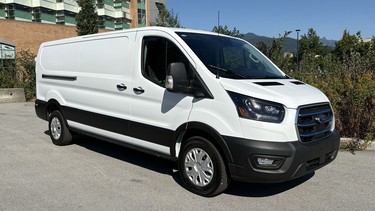Technology
Ford Unveils 2025 E-Transit: The Future of Cargo Vans

The 2025 Ford E-Transit has been launched, presenting a significant advancement in the electric cargo van market. This all-electric vehicle is designed to meet the daily demands of businesses, boasting a range of 256 kilometres on a full charge, making it ideal for urban work scenarios. It is particularly well-suited for tradespeople and logistics operations, allowing for efficient transportation and delivery without the noise pollution associated with traditional internal combustion engine (ICE) vehicles.
The E-Transit is available in various configurations, including long lengths with different roof heights. It is powered by a single 89-kWh lithium-ion battery that delivers 198 kW (approximately 266 horsepower) and 317 lb-ft of torque. This combination provides robust performance essential for carrying heavy loads. The vehicle features a rear-mounted electric motor and a one-speed transmission, which contributes to a smooth driving experience.
Charging and Versatility
Charging capabilities have improved significantly with the 2025 model. Equipped with dual onboard chargers, the E-Transit can achieve a peak fast-charging rate of 176 kWh. According to Ford, just 15 minutes of charging can add up to 107 km of range. Though real-world charging times may vary, the vehicle is designed for overnight charging, achieving a full charge in approximately six hours when connected to a Ford Pro Series 2 80A charging station.
The inclusion of the Pro Power Onboard feature allows users to plug in tools and equipment directly from the van’s battery. This eliminates the need for external generators and enhances the vehicle’s utility for tradespeople. The system can be easily activated and is designed to conserve battery life by shutting down when the charge reaches a specified low level.
Driving Experience and Market Position
In terms of driving experience, the E-Transit feels much like a traditional cargo van, with no unusual electric vehicle characteristics in its controls or displays. The vehicle maintains a familiar fuel gauge interface, indicating energy levels in a straightforward manner. Upon starting the E-Transit, drivers can expect immediate acceleration, characteristic of electric vehicles, which can be particularly beneficial in urban settings.
While the E-Transit excels in performance and practicality, its pricing poses a challenge for widespread adoption. The base MSRP is set at $72,695, compared to the ICE version starting at $58,595, creating a notable price gap of $14,100. This difference may deter some potential buyers, despite the long-term savings associated with electric vehicle operation.
In the competitive landscape, the E-Transit faces rivals such as the Ram ProMaster priced at $76,999, the Mercedes-Benz eSprinter starting at $87,498, and GM’s BrightDrop at $102,805. These vehicles highlight a growing interest in the electric commercial van segment, although the market remains relatively small.
Overall, the 2025 Ford E-Transit represents a solid choice for businesses seeking a reliable electric cargo van. Its combination of power, range, and innovative features positions it as a leader in the evolving electric vehicle market. Ford’s commitment to maintaining the E-Transit’s traditional cargo van design while incorporating modern electric technology has proven effective, making it a compelling option for companies looking to transition to sustainable transportation solutions.
-

 Education3 months ago
Education3 months agoBrandon University’s Failed $5 Million Project Sparks Oversight Review
-

 Science4 months ago
Science4 months agoMicrosoft Confirms U.S. Law Overrules Canadian Data Sovereignty
-

 Lifestyle3 months ago
Lifestyle3 months agoWinnipeg Celebrates Culinary Creativity During Le Burger Week 2025
-

 Health4 months ago
Health4 months agoMontreal’s Groupe Marcelle Leads Canadian Cosmetic Industry Growth
-

 Technology3 months ago
Technology3 months agoDragon Ball: Sparking! Zero Launching on Switch and Switch 2 This November
-

 Science4 months ago
Science4 months agoTech Innovator Amandipp Singh Transforms Hiring for Disabled
-

 Education3 months ago
Education3 months agoRed River College Launches New Programs to Address Industry Needs
-

 Technology4 months ago
Technology4 months agoGoogle Pixel 10 Pro Fold Specs Unveiled Ahead of Launch
-

 Business3 months ago
Business3 months agoRocket Lab Reports Strong Q2 2025 Revenue Growth and Future Plans
-

 Technology2 months ago
Technology2 months agoDiscord Faces Serious Security Breach Affecting Millions
-

 Education3 months ago
Education3 months agoAlberta Teachers’ Strike: Potential Impacts on Students and Families
-

 Science3 months ago
Science3 months agoChina’s Wukong Spacesuit Sets New Standard for AI in Space
-

 Education3 months ago
Education3 months agoNew SĆIȺNEW̱ SṮEȽIṮḴEȽ Elementary Opens in Langford for 2025/2026 Year
-

 Business4 months ago
Business4 months agoNew Estimates Reveal ChatGPT-5 Energy Use Could Soar
-

 Technology4 months ago
Technology4 months agoWorld of Warcraft Players Buzz Over 19-Quest Bee Challenge
-

 Business3 months ago
Business3 months agoDawson City Residents Rally Around Buy Canadian Movement
-

 Technology2 months ago
Technology2 months agoHuawei MatePad 12X Redefines Tablet Experience for Professionals
-

 Business3 months ago
Business3 months agoBNA Brewing to Open New Bowling Alley in Downtown Penticton
-

 Technology4 months ago
Technology4 months agoFuture Entertainment Launches DDoD with Gameplay Trailer Showcase
-

 Technology4 months ago
Technology4 months agoGlobal Launch of Ragnarok M: Classic Set for September 3, 2025
-

 Technology4 months ago
Technology4 months agoInnovative 140W GaN Travel Adapter Combines Power and Convenience
-

 Science4 months ago
Science4 months agoXi Labs Innovates with New AI Operating System Set for 2025 Launch
-

 Top Stories2 months ago
Top Stories2 months agoBlue Jays Shift José Berríos to Bullpen Ahead of Playoffs
-

 Technology4 months ago
Technology4 months agoNew IDR01 Smart Ring Offers Advanced Sports Tracking for $169










